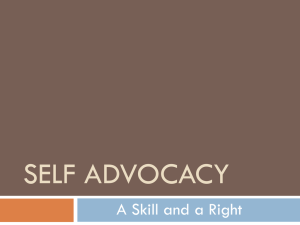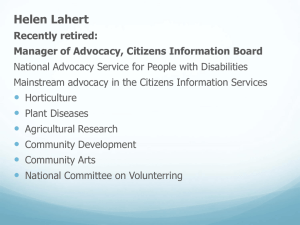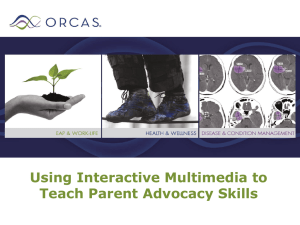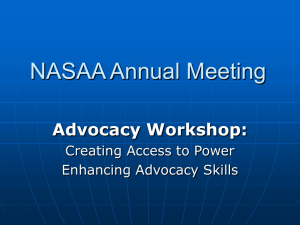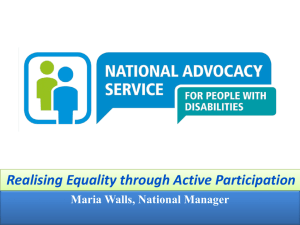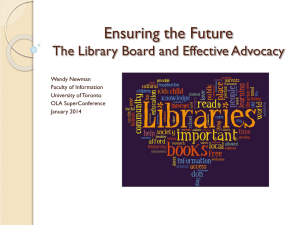Self Advocacy Leading to Student Led Annual Case Reviews
advertisement
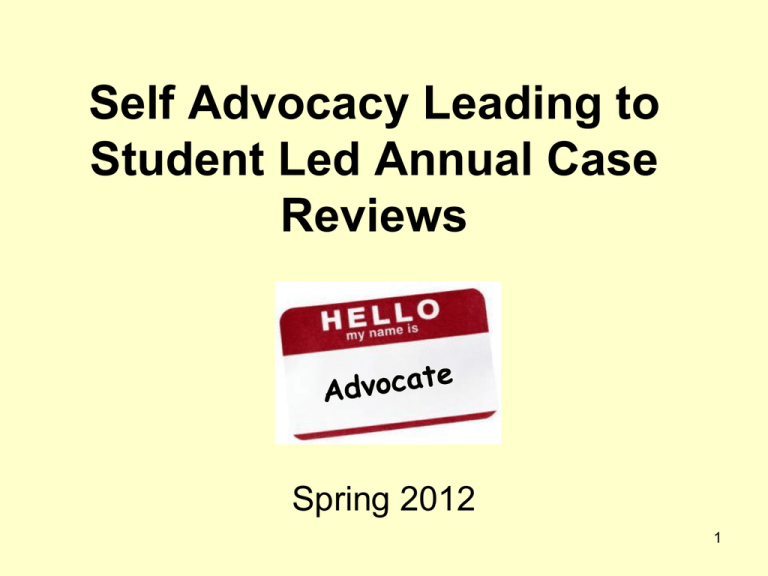
Self Advocacy Leading to Student Led Annual Case Reviews Spring 2012 1 2 What is Self Advocacy? “An individual’s ability to effectively communicate, convey, negotiate or assert his or her own interests, desires, needs, and rights. It involves making informed decisions and taking responsibility for those decisions.” (LDOnline) My students will tell you that self advocacy means “standing up for myself and my needs.” 3 Why is Self Advocacy Important? • Most college faculty and academic advisors have received very little preparation in special education. (CEC) • Most employers receive little training in working with individuals with disabilities. 4 4 Basic Areas • Knowledge of Self – Knowledge of Strengths and Weaknesses – Awareness of Learning Styles – Understanding of Your Disability • Communication – Communicating Your Needs – Communicating With Others in the Classroom and the Real World • Awareness of Others – Knowledge of Other People with Similar Disabilities – Knowledge of Other People with Different Disabilities • Educational Involvement – Speaking Up for What You Need in the Classroom – Speaking Up for What You Need in the Real World – Participating in the Development of Your IEP 5 Knowledge of Self Activities • Personality Survey • Learning Style Assessment • Explore Strengths and Weaknesses • Career Interest Survey • Independent Living Skills Inventory • Writer’s Notebooks • Explore What Your Own Disability Is 6 Communication Activities • Listening/Following Directions Activities • Team Building Activities • Leadership Activities • Survey of Self Advocacy • Teacher Survey of Self Advocacy 7 Awareness of Others Activities • Understanding Other’s Disability • Famous People with Disabilities • Learning for Life Program • Social Skills Activities 8 Educational Involvement Activities • What is Self Advocacy? • What is an IEP? • Knowing Your Present Levels – Weekly Grade Checks – Discussing testing results with students • Communication with Guardians • Leading Your Own Annual Case Conference 9 What It Looks Like In My Classroom • Students who are in a resource class spend one class period a week (50 minutes) learning about and practicing self advocacy. • Students on consultation are met with at least 30 minutes a grading period. • Students in remediation classes spend one class period every two weeks learning about and practicing self-advocacy. 10 Why Student Lead Conferences? “Students who can identify their own strengths and weaknesses, as well as how to communicate their needs,… can increase their chances of success.” (Lock and Layton) Students who lead their own conferences have a better understanding of who they are, what they need to succeed and able to communicate to their teachers, professors and employers. 11 Where to Start • Talk to your department head and your colleagues • Talk to your administrators • Talk it up to your students! • Start small and build from there! 12 Group & Individual Interviews Name _______________ ACR Portfolio Worksheet My Strengths Three strengths that I have are ___________________________________________ Learning Style Survey I took a learning style survey. Based on the survey, my learning style is __________. This means that I benefit from ___________________________________________ On learning strategy that might help me is _________________ Self Advocacy Update Self advocacy is ______________________________________________________ I feel I am doing a(n) _______________ job at advocating for myself. I have improved my self-advocacy by _____________________________________ I still need to work on __________________________________________________ Transition Information Regarding independent living skills after high school, I will…___________________ Regarding education and training after high school, I will…____________________ Regarding employment after high school, I will…____________________________ My Goals My goals areas are:___________________________________________________ I have made good progress in the area of:_________________________________ I still need to work on:_________________________________________________ • Interview students about the questions needed to complete the IEP. My Accommodations The accommodations I use the most are:_________________________________ I would like to add/ remove the following accommodations:____________________ Proposed Schedule for Next Year English 8; Pre-Algebra; Social Studies 8; Science 8; Health and PE ________________________ ________________________ 13 Build Conference Folder • Gather all the data and put it in a folder. • Include page numbers and titles whenever possible. • Include icons/pictures that correspond with the agenda to help students follow along. • Using folders allows you to add last minute or extra information into the pockets (ex-behavior reports, etc). 14 Agenda Annual Case Review Agenda for Students YOU ARE A PART OF YOUR CASE CONFERENCE COMMITTEE!!!! SPEAK UP IF YOU HAVE QUESTIONS OR CONCERNS. TELL THE GROUP WHAT YOU NEED TO SUCCEED IN REACHING YOUR GOALS! 1. The teacher will give the purpose of the meeting 2. Everyone will introduce themselves. 3. The teacher will offer Parent Rights to your guardian. 4. The teacher will check your address and information. 5. You will tell about your strengths (Page 3). Your guardian will then talk about your strengths. 6. You will present your present levels of performance (Pages 4-9). 7. The committee will talk about if we should conduct more testing. 8. You and your guardian will be asked if they have any concerns 9. The committee will then talk about any behavior concerns they have. 10. Discuss the transition activities that you have completed this year (Pages 10- 15). 11. The committee will discuss state testing and accommodations. 12. You will tell about your goals (Page 16). The committee will then discuss your goals for next year. 13. You will tell about your accommodations (Page 17). The committee will then talk about your accommodations. 14. The committee will discuss your current special education services. 15. You will present your proposed schedule for next year (Page 18). 16. The committee will talk about any other special considerations (such as transportation, etc.) 17. Other questions or concerns from the committee. 18. Meeting is adjourned. • Provide the students with an agenda to help them follow along and understand what they should say and when. 15 Mock Case Conference • The next step is to hold a mock case conference. This was a great opportunity to model for the students what they would need to do during the meeting. 16 Group Conference Practice • Page-by-Page lead the students through their individual folders. 17 Peer Conference Practice • Have students pair up with a friend in class-- someone they feel comfortable sharing information with. • Lead the whole group in a mock conference, this time giving the students time to explain their information to their peer. 18 Adult Conference Practice • Get teachers and staff members that are familiar with the students to help. • Pair the students up and have them present their information to the adult in a one-on-one or one-on-two situation. • To help facilitate this, give the adult a list of questions to guide the conversation. 19 Conference Practice with an Adult ACR Adult Interview Here is are the general questions and potential answers. Feel free to ask additional questions. What are your strengths? (page 3) “Some of my strengths are…” Tell me about your Star Math Scores. (page 4) “I am working at a ____ grade level.” “My scores are increasing/ decreasing.” Tell me about your Scholastic Reading Inventory scores. (page 5) “My scores are increasing/ decreasing.” “I am currently working at a ____ grade level.” Tell me about your Voyager score. (page 6) “My lexile has increased/decreased.” “My fluency score has increased/decreased.” Tell me about your Aquity results. (page 7) “My English score went up/down.” “My Math score went up/down.” etc. Tell me about your semester grades .(page 8) “I earned a B in Math. Etc…” Talk with me about the personality test you took. (page 10) “I took a personality test. It said I have a ISTJ personality. Some of the traits people with have are… Some possible careers for this personality type are…” Some adults you may include: Teachers Administrators Counselor Social Worker Speech/OT/PT Paraprofessionals Cafeteria Workers Custodians What is your learning style? (page 11) “I am a tactile learner.” What is self advocacy? (page 13) “Self advocacy is standing up for myself and my needs.” What were some of the results of your career interest survey? (page 14) “Some careers I should consider are…” ***Remind them about confidentiality! Tell me about your transition information. (page 15) “After high school I plan to live….” “I plan to get training at…” “I hope to get a job…” What are your goal areas and how are you doing with those goals? (page 16) “My goal areas are…” “I have made progress in the area of …” “I still need to work on…” 20 The Real Deal!!! • At the conference: – Remind the students to relax and that you will help them as needed. – Play the role of Oprah– The people really want to hear want your guest has to say!! Your job is to keep things moving along. 21 The Results • Students are the star of the show! • Students gained confidence and a better understanding of their abilities and disability. • Conferences took less time and remained on focus. • Guardians left with not only their student’s IEP but also a folder of information about their student. 22 The Next Steps • This year I plan to add the following things to the curriculum: – More activities focusing on how to work successfully in a group – Two novels about students with disabilities • Touching Spirit Bear • Haze – Involve the students on consult in more self advocacy activities 23 Reflection •Will this concept work for you? Can you use parts of the idea? The whole idea? What can you change to make it work for you? • When can you meet with students to acquire the information you need? • Who do you need on your team to accomplish the goal of student led conferences? 24 Questions What questions can I answer for you??? 25 Resources • Cummings, ED.D. Rhonda and Gary Fisher, PH.D. The Survival Guide for Teenagers with LD*. Free Spirit Publishing.1993 • Heck, Tom. Team Building Games 101. 2005. teachmeteamwork.com. • Kademan, Robyn and Shawdi Nesbit. Taking Time for Teamwork. Lorenz Educational Press. 2011. •Neill, James. Wilderdom-A Project in Natural Living and Transformation. Copyleft. http://wilderdom.com/games/ •Paulson, Nicole. Difabiilities-Self Advocacy and the Individualized Education Plan. 2010. http://www.difabilities.net/index.htm 26 Potential Class Reads • Touching Spirit Bear by Ben Mikaelsen • Just Another Girl by Melody Carlson • Zipper, the Kid with ADHD by Caroline Janover • Haze by Kathy Hoopmann • Out of My Mind by Sharon Draper • 7 Habits of Highly Effective Teens by Sean Covey 27
